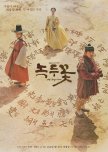A Highly Underrated Masterpiece
This is my first review because I never felt the urge to write review for the K-Dramas I have watched. I usually avoid dramas with dark undertones and bloody battle scenes. So I kept putting off this drama. Finally I decided to watch it because of my love for Shin Yoo Shin.
I am not very familiar with Korean history except from what I learned from sageuks and I cannot comment on the historical accuracy of this drama.
Acting, storyline, pace and music: everyt aspect was perfect. There was a bit of humor here and there, romanticism was not on the foreground. However The Nokdu Flower amazed me with all the moral, social and political dilemnas it tackled. It lead me to contemplate my values.
Does the end justify the means? Can civilization be achieved only through barbarism? Is civilization a mask for barbarism?
Can war and betrayal turn a young naive man into a cruel ogre? Is cruelty justified by experiencing injustice and betrayal? Who is right, who is wrong?
If there is the heavens (aristocrats), there is also the earth (peasants). Can people really be equals under unequal conditions? How can nations/governments provide equal conditions?
"It is always the really weak who change the world" says Jeon Bong Jun. Yes, but at what cost? Does change justify the thousands of lost lives? What is it that the humankind just can't share? In the end does it come to greed, monetary profits, power or difference in beleifs?
So much to think about!
Even you do not want to think, the drama never bores throughout 24 episodes.
I am not very familiar with Korean history except from what I learned from sageuks and I cannot comment on the historical accuracy of this drama.
Acting, storyline, pace and music: everyt aspect was perfect. There was a bit of humor here and there, romanticism was not on the foreground. However The Nokdu Flower amazed me with all the moral, social and political dilemnas it tackled. It lead me to contemplate my values.
Does the end justify the means? Can civilization be achieved only through barbarism? Is civilization a mask for barbarism?
Can war and betrayal turn a young naive man into a cruel ogre? Is cruelty justified by experiencing injustice and betrayal? Who is right, who is wrong?
If there is the heavens (aristocrats), there is also the earth (peasants). Can people really be equals under unequal conditions? How can nations/governments provide equal conditions?
"It is always the really weak who change the world" says Jeon Bong Jun. Yes, but at what cost? Does change justify the thousands of lost lives? What is it that the humankind just can't share? In the end does it come to greed, monetary profits, power or difference in beleifs?
So much to think about!
Even you do not want to think, the drama never bores throughout 24 episodes.
Was this review helpful to you?



